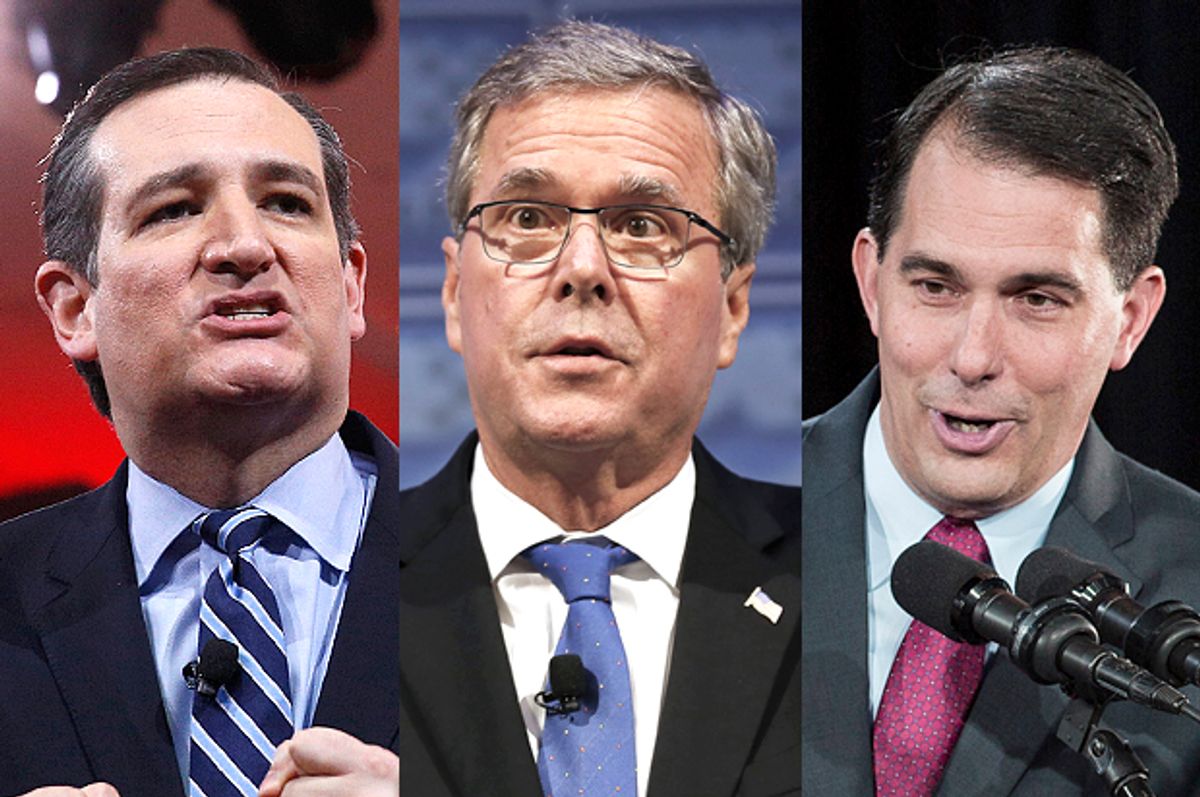The rapid realignment of public and judicial opinion over the last decade toward gay rights has embroiled the Christian right in an existential crisis. That’s the way they see it, at least, which is why they’re framing the advance of gay rights in America as an assault on “religious freedom” generally, and Christianity specifically. It’s a bogus argument – the religious freedoms of Christian conservatives are not and never have been dependent upon the denial of rights to gay people – but the cause is being championed by conservatives in state governments who have moved to pass laws protecting discrimination against gays as an expression of “religious freedom.”
One of those conservatives is Indiana Gov. Mike Pence, who signed the Religious Freedom Restoration Act into law yesterday. The law will allow business owners who refuse to provide services to gay people to cite their religious beliefs in their own defense if they end up getting sued. The idea here is to broaden the notion of what the government should consider to be an expression of faith to include the exchange of money for goods and services. Even worse, this law and others like it are written very broadly and could allow for all manner of discriminatory behavior.
As you might imagine, the Indiana law is extraordinarily controversial. Paul Waldman, writing at the Washington Post, notes that the controversy over the law could very easily spill over into the 2016 Republican presidential nominating contest:
The more news this Indiana law gets, the more likely it is that it will become an issue in the presidential primaries. And it fits neatly within the key divide among Republicans: on one side you could have business groups that are nervous about negative economic impacts and strategists who don’t want the GOP to be known as the party of discrimination, while on the other side you have candidates eager for the votes of religious right primary voters.
It’s not hard to pick out the 2016 aspirants who would be most likely to support Pence on this one. Basically, if they’ve ever said anything in defense of the homophobic asshole from that stupid duck show – looking at you, Bobby Jindal – then there’s a pretty strong chance they’ll get down with the Religious Freedom Restoration Act. This fight also fall squarely within Rick Santorum’s and Mike Huckabee’s cultural-resentment wheelhouses.
If there’s anyone this issue is tailor-made for, though, it’s Ted Cruz. When Cruz formally announced his presidential campaign earlier this week, he explicitly stated that he hoped to ride to victory on the backs of Christian conservatives. Speaking at a Christian university founded by the guy who blamed 9/11, in part, on “the gays and the lesbians,” Cruz said that “roughly half of born-again Christians aren’t voting” and asked everyone listening to imagine “millions of people of faith all across America coming out to the polls and voting our values.” He needs to motivate conservative Christians to get behind his candidacy, and he loves immersing himself in controversy – the Indiana pro-discrimination law checks both those boxes.
And, weirdly enough, while Cruz doesn’t have a whole lot in the way of “experience” to boast about, he does have something to bring to the table when it comes to fighting on behalf of Christians against government “overreach.” As the Texas solicitor general, Cruz made it a point to seek out and argue cases involving some sort of religious controversy:
Other cases he took on reflected his conservative Christian ideology. On his campaign website, he touts successfully defending the inclusion of the term "under God" in the Texas Pledge of Allegiance and a Ten Commandments monument on the grounds of the state Capitol. He notes that he fought in the courts to protect a Bible display installed on public property and to have the divorce of a same-sex couple's civil union invalidated because they'd gotten hitched in Vermont.
As a senator he’s given several speeches exhorting conservatives to stand up for the rights of Christians against what he says is government persecution, and he’s thrown his weight behind local fights over “religious freedom.”
What will be interesting to see is if and how candidates like Jeb Bush react to the Indiana “religious freedom” controversy. Bush is a Christian and plenty conservative, but he also has an eye on appealing to primary voters outside the Christian right, and appealing to a broader American electorate that is far more supportive of gay rights. For my money, though, the man to watch will be Rand Paul. Remember, there was a time not long ago when Rand Paul said that even though it was bad business to “exclude anyone” from your establishment, he nonetheless believed in “private ownership” and resisted government encroachment on the practices of “private business owners.” He has, of course, since disavowed ever having believed anything of the sort, but who knows – maybe the Indiana “religious freedom” law and the need to win over some primary voters will rekindle some of that old-school libertarianism.

Shares